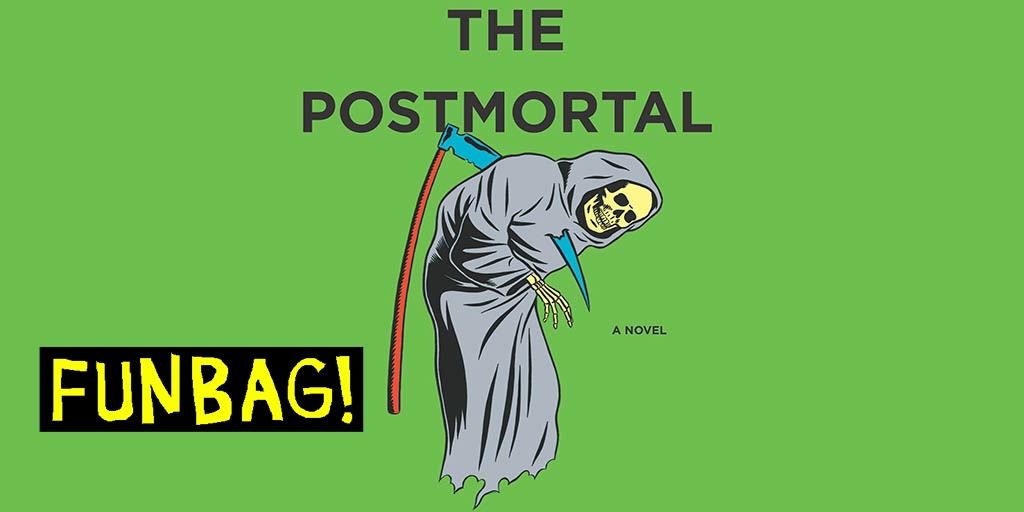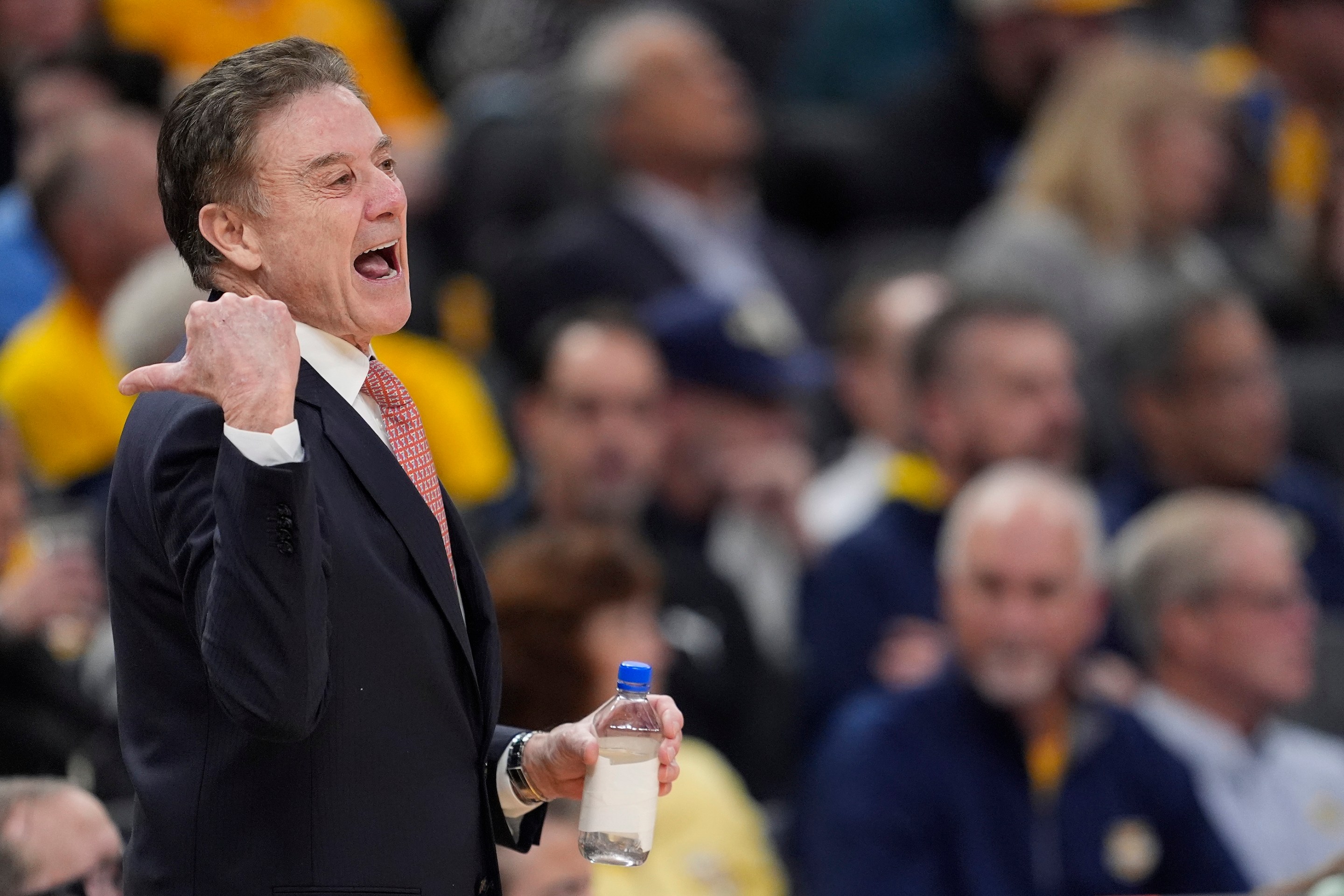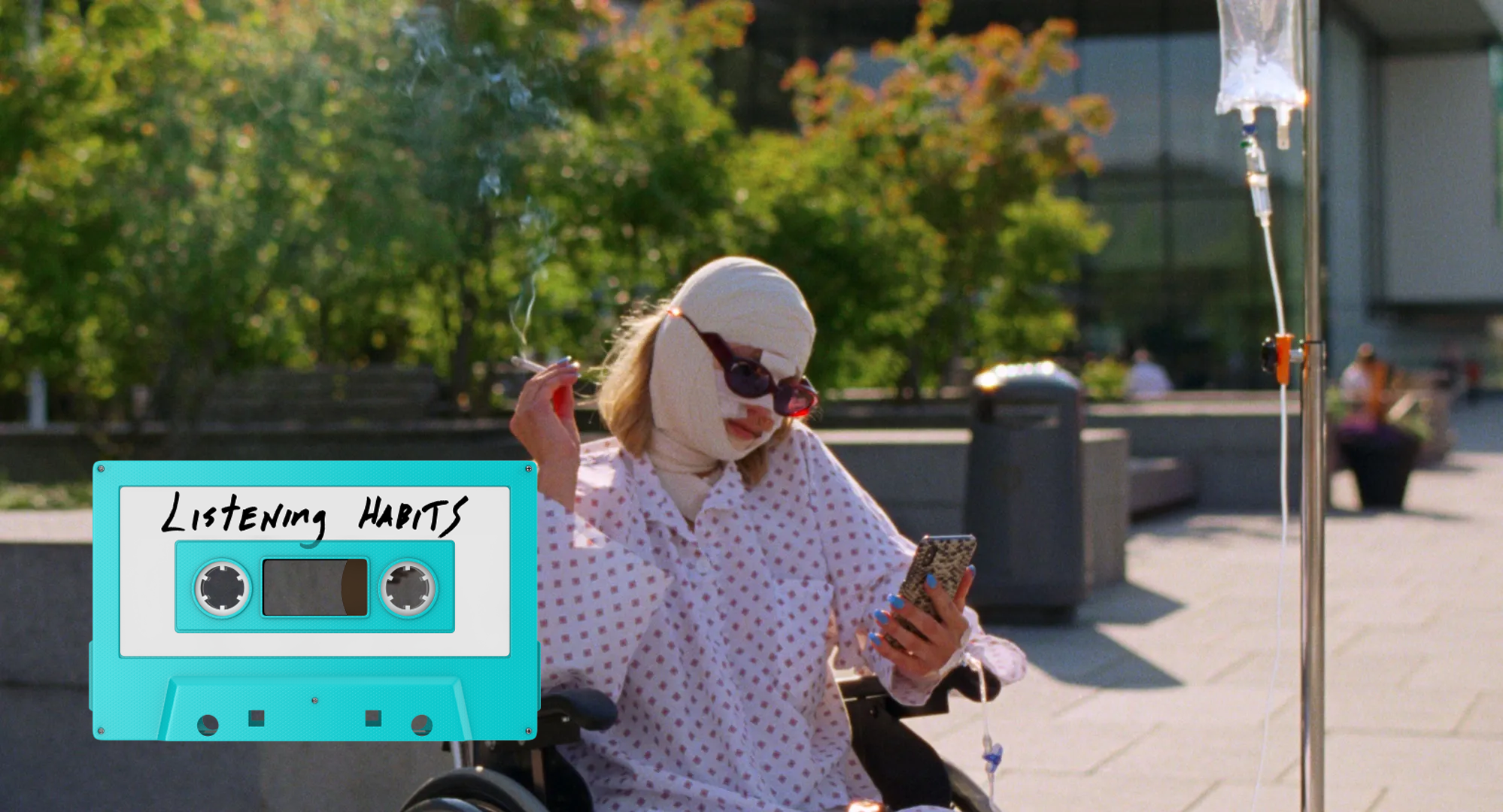Time for your weekly edition of the Defector Funbag. Got something on your mind? Email the Funbag. You can also read Drew over at SFGATE, and buy Drew’s books while you’re at it. Today, we're talking about college coaches, Muppets, overpriced herbs, and more.
Your letters:
Chris:
I read The Postmortal a number of years back, and it has legitimately haunted me. I have always tried to either not think about death, or hope that science will solve that whole thing by the time I get old. The book not only forced me to think a lot about death, but also very clearly presented what was presumably your point of view: that aging and death is necessary, and that living forever at a fixed point would cause all sorts of problems for everyone. Now that you've had a legitimate near-death experience, has your opinion changed? Do you find yourself wanting to push pause on aging before you get TOO creaky, or do you still view it with the rationality you did as a younger author further away from the realities of geriatric life?
Funny you should ask about that book, Chris, because I was planning to write a retrospective about The Postmortal. So let me use your question to do just that.
The Postmortal is the first novel I ever wrote. It’s about a world in which a cure for aging has been invented and commoditized. I got the idea while watching a 60 Minutes segment in which the late Morley Safer explored the potential health benefits of drinking red wine. The report zeroed in resveratrol, a chemical in red wine that had potential anti-aging effects. Safer wryly mused that, were science to ever fully harness the power of this chemical, we all might be able to live forever. He found the possibility exciting, as anyone might. But in my head, I was like, “Well if we could all live forever, we’d all just end up killing each other.” Then I thought about HOW that would go down exactly, so I opened up a Word doc and started writing a manuscript titled The Cure For Death.
It was the summer of 2009. I had just been laid off from my ad job for the third time, forcing me to hustle for any and all freelance blogging work I could find. I had also just been arrested for DUI, which took another $4,000 out of the family kitty. And my wife had delivered our second kid that February. I’d already published one book, Men With Balls, but no one really bought it. I knew I wasn’t going to be able to provide for my family on blogging alone, and my advertising career was in irons. I had to write another book, one with more heft. A novel. The problem is that if you’re not a brand-name author, you have to write the whole novel if you want to sell it. That’s a lot of work with zero guarantee of success. John Kennedy Toole was never able to get his masterpiece, A Confederacy of Dunces, off the ground while he was alive. He died by suicide at 31. It was only after his death that Dunces became a landmark novel. So even if you deserve to have the bet on your novel pay off, it still might not.
I preferred to write a novel that sold and prospered while I was still alive, and The Cure For Death was the only idea I had in the lab. So I ran with it, spending nights in our basement punching away at my little opus on a shitty Dell laptop. I had no idea how to write a novel, but I’d just finished World War Z by Max Brooks, which told a fictional story in a nonfiction format (oral history). That format felt less imposing to me, as a blogger who only really knew how to write in 1,000-word chunks. So I wrote The Cure For Death in an epistolary format, including wire reports, news transcripts, link dumps, and (naturally) blog posts.
At the time, I did not know what the word “epistolary” meant. I was also still a relative child when it came to confronting mortality. I didn’t like thinking about death. Hated the idea of being trapped in a black void from my death until the extinction of the universe. It made me quietly panicky. So I wrote The Cure For Death as a way of forcing myself to face that fear.
Along the way, I found comfort in the fact that everyone dies, and that everyone MUST die so that future life can thrive. I felt less panicky about death and more curious. Turn death into a choice, and suddenly you start to ask yourself a lot of questions. Why are Americans like me so frightened of death when other cultures celebrate it? Isn’t eternal life just as imposing a fate as eternal death, if not more so? Is living longer an inherently selfish thing to do? Death is the only thing in this world that is both permanent and unknown. You and I can’t answer any big question about death with authority, because we’re still here. And once we die, we can’t come back to give everyone else the scoop.
Lord knows that humans have tried, every which way, to resolve this paradox. They’ve sailed to new continents in search of magic anti-aging fountains that do not exist. They’ve formed religions that not only affirm the existence of an afterlife, but provide written instructions on how to get there. They’ve held séances to communicate with the dead. They’ve believed in ghosts. They’ve built monuments to themselves, so that their works will live forever if their bodies can’t. They’ve explored every scientific alleyway in search of a cure for death, with many businessfolk today still insisting that such a cure can be found. You can buy resveratrol supplements on Amazon now. They don’t cost much. You’ll still die anyway.
I sent an unfinished draft of The Cure For Death, clocking in at maybe 60,000 words, to my agent at the time. She sent me what was essentially a form letter in reply, telling me the book was no good. I found her dismissal so rude that I took it to another agent named Byrd Leavell. I figured Byrd would also shoot the book down, but at least I could say that I tried. Instead, Byrd called me within a few days and was like, “Holy shit.” I could live another 1,000 years (I won’t), and I’ll never forget that turn of events. Every writer, every actor, every musician dreams of getting THAT phone call. I got it.
If only that had been the end of it. Alas, I still had to fix the book I’d sent to Byrd, and then pray that a publishing house would buy it. Byrd forced me to rewrite the entire back half of The Cure For Death, and to give the main character a real name (he was merely an anonymous blogger with the handle “X” in the original draft). Byrd suggested the name John Farrell, named after the director of a film titled Everyman (not named after the baseball manager). I made all the revisions and ended up with a draft that both Byrd and I really liked. He submitted it to publishers in the summer 2010. The first house passed, as did the second, and so on and so on. Weeks dragged on. No news was bad news.
Finally, an editor at Penguin named Tom Roberge, who just happened to be a big Deadspin reader at the time, took pity on my manuscript and offered a $25,000 advance for it. Paperback only. It was a nothing offer, but it was the only one I’d gotten. I took the deal and thanked Tom 10,000 times over. I hadn’t made a killing, but I was going to be a published novelist. That’s no small line item on a résumé if you’re in my line of work. I told myself that if all I made off of the newly retitled Postmortal was $25,000, I’d be fine with it. That was a lie. I wanted more. I’m an American. I always want more.
I got it. A few months later, a British imprint offered $45,000 for the UK rights and retitled the book The End Specialist for that market. Then a German publisher bought it. Then Poland. Then Spain. When the novel came out in the U.S. in 2011, it got good reviews. It even got nominated for a couple of awards. I didn’t win them, which is why you’re getting my acceptance speech right now instead of the Hugo Awards. My apologies.
Then came even more. Director Scott Derrickson, who would go on to make Doctor Strange, optioned the right to The Postmortal for the screen, then transferred those rights to AMC, which bought the rights in full. A number of colleges—South Carolina, Cal State Northridge, and a few others—then made the book their freshman-year common read. They invited me to speak to their first-year students (and paid me handsomely to do so). At South Carolina, they showed me an entire room of Postmortal-inspired art projects the students had done. I had always wanted to be a big-time writer, and now I was looking at my work being reflected back at me through the artwork of others. I had a book that was being taught in fucking schools, man. How many people get to live out that dream? One in a hundred million? I could barely process it.
I still can’t. I was a desperate, alkie blogger just trying to make some extra tuition money by writing this book. It was an investment in myself, the only one I knew how to make at the time. Writing a novel on spec isn’t the wisest get-rich-quick scheme ever devised, so this was a classic case of finding success from being too young and stupid to heed caution. I hoped that Postmortal would become an instant smash, of course. Instead, it became a novel with a remarkably long shelf life. I’ve met readers who have read it multiple times. I’ve met fans who got tattoos of the novel’s dead reaper cover art. I even met one woman at Comic-Con who told me that The Postmortal was the last book her brother shared with her before he died suddenly. She broke down in tears when she told me that. I was so taken aback that I think I told her, “Thank you,” in response, which probably sounded weird. Thanks for losing your closest friend!
The Postmortal earned out that initial $25,000 advance with relative ease, and then kept selling afterward. To this day, I get a sales statement every quarter from Byrd’s old agency, plus a check for that time period’s sales royalties. The check is usually around $1,500, which is lovely enough on its own. But this past week, the cumulative sales tally clocked in at just about 90,000 copies (print and ebook) in North America. That’s not bad for a book that never made a bestseller list and has yet to be adapted for TV or film (I’ve never gotten word of a Postmortal show gearing up for production, so I assume the idea remains in AMC’s dry dock). It’s pretty good, in fact, for a book written by a rookie and featuring a protagonist who isn’t terribly likable.
I’ve written four more books since Postmortal, and have become a better novel writer since its publication. But none of my other books have sold as many copies. Maybe that’s because the premise of The Postmortal remains solid, or maybe because the story—which is about how technology accelerates mankind’s self-destructive habits to an extreme degree—reflects the current state of the world. Or maybe it’s because we’re now living with the consequences of powerful people who genuinely wish to live forever. Or maybe it’s because the sex scenes are kinda hot. I don’t know. I’m just glad I wrote it, and that people were able to connect with it on a psychic level.
That includes my dad. I remember sending my parents a galley of The Postmortal and having no idea how they’d react to it. My old man got on the phone. When I asked him how he liked it, he paused for a second before blurting out, “It’s fucking masterpiece!” He never said that about any of the other books I wrote, so I’m pretty happy the first one did the job.
I lost Dad a year ago. I myself nearly died seven years ago. But in some ways, writing The Postmortal prepared me for all of that heartache. It impressed upon me that death is inevitable, necessary, and ultimately good. I felt that way after finishing the novel, and I still feel that way today, all these years later. I’m closer to the end of my life than I was 16 years ago, but undaunted by it. To fear death is to misunderstand it. I’m wise enough to know that now, and life has given me too much for me to ruminate over its finiteness. This life is all I get, but it’s been more than enough. No matter when I die, or how, I’ll die a lucky man.
But I don’t plan on dying anytime soon. I’ve got more royalty checks to cash.
HALFTIME!
John:
I don't think I've seen a Defector official Muppet power ranking. Feels like something you would all have opinions on. For my money, it's the Swedish Chef. Honorable mention to Statler and Waldorf.
Speaking of events that would cause everyone to kill each other … no chance that I pitch that question to the rest of our staff. Someone would say “Gonzo sucks” and then all hell would break loose. We take our Muppets seriously here at Defector. Ranking them would be tantamount to sacrilege. And do we even include Sesame Street characters as Muppets? Is Cookie Monster Muppet? If Cookie Monster not Muppet, what is Muppet?
Anyway, I’ll leave that dispute to the comment section below. Instead, let me just shout out the Muppets who make me laugh every time I see them in a non-advertisement setting: Animal, Swedish Chef, and Beaker. Beaker is probably my favorite. He’s certainly the one I mimic the most frequently. When Christmas comes around, I love to re-enact the scene in Muppet Christmas Carol where Beaker gives Scrooge the finger. MIMIMI!!!
And let’s give a special moment of recognitions to Sweetums the ogre. If I was one of those people who actually tried during Halloween, I’d make myself a Sweetums costume.
Paul:
When coaches like Dabo and Gundy rant about players getting paid, why do reporters not ask them why their salaries don't undermine the integrity of the game and competitive balance? You can't tell me that whomever coaches a Top 5 FCS or even a D3 team couldn't do what Gundy or Schiano do for 1/10 the salary.
I have to give Paul credit here for throwing out a take that will force me to defend the likes of Dabo Swinney and Greg Schiano. But let’s handle Question One first: Why do Clemson beat reporters never challenge Dabo when he says a bunch of crazy Dabo shit? Because they’d lose their access if they did that. That’s true across pretty much every beat now; ask all of journalists who just got frozen out by the Pentagon. These are not men who like being questioned, and so they’ve built a system where they can’t be.
The silver lining here is that, at least when it comes to sports, the results force questions. So while the local press won’t necessarily challenge Dabo on his outrageous salary, they absolutely will ask him why his asshole team lost by two scores at home to SMU:
"We'll win more championships. We'll win more championships. All right? I promise you that. May not happen this year, but we're going to win more championships. That's all I can say. And I think we have a track record that demonstrates that."
Fun to watch him squirm, isn’t it? That’s the beauty of the games. You can dodge all the questions you want, but eventually you’ll have to answer to the scoreboard. There’s no escaping it. And when you lose, all of those beat guys who couldn’t ask you the big questions will take it out on you by questioning every single in-game decision you made, in real time. At least that pleasure hasn’t been stolen from us.
Now, let me defend Dabo from Paul’s “If the troops wanted to, they could assemble a coaching staff that would dominate the SEC” take. Clemson was a middling program for decades before Dabo got there. Same deal with Georgia before Kirby Smart got hired. Fans like me always think that we can do a coach’s job well as the coach can. This is because coaches don’t have to play. I can’t quarterback a Power Four offense, but I can stand on a sideline and yell for four hours. That shit can’t be that hard.
But it very much is that hard. A D-I college coach has to answer to fans, to the TV networks, to administrators, to donors, and to recruits in both high school and in the transfer portal. That’s on top of having to do all of the actual coaching shit. And if you lose a single game during the regular season, especially to an underdog, you get bomb threats called in to your house. Bill Belichick can’t do this job, so it would be dumb to take it as a given that the current head coach at Northeast Oberlin could.
This is because coaching is a talent. I don’t normally think of coaches as talented, mostly because I’m too busy watching players be visibly talented out on the field. But if you can take over a big college program and win games despite the insane amount of bullshit that job entails, you’re not just some replacement-level slob. You’re a standout. Rutgers has finished in the top 25 only once this century. Greg Schiano, a true shithead, was a big reason why. Just use hand sanitizer after you shake his hand.
Mark:
Folks seem to forget that Penn State was pretty much dead and buried in the wake of the Paterno-Sandusky scandals. James Franklin is coming off three straight seasons with double-digit wins. He took the team to six New Years' bowl games in his dozen years and to the College Football Playoffs semifinals 10 months ago. He has among the most wins of any college coach in the past 10 years. And now Penn State is on the hook for around $50M for Franklin, plus another $6M or so for a replacement, and who's to say the replacement will be anywhere near as good? Was this a ridiculous panic move by Penn State? Or a smart choice to dump the guy who could never figure out how to win the big game?
Dammit Mark, I just had to defend Dabo Swinney and Greg Schiano. Now I have to cape for James fucking Franklin? I’m not talented enough for such debates. Besides, Franklin has already gotten a love in the wake of his ouster, both from people I respect and people I do not. All of those people, like Mark, have the same, solid argument: that Penn State was dead and buried after the Paterno scandal, that Franklin ran the program about as well as anyone in his position could have been asked to, and that he churned out All-Pro level talent on a regular basis. He’s a talented coach.
But also, fuck that guy. Don’t take a D-I job and expect everyone to be happy if you go to the Marmalade Bowl every year. This is college football, where unreasonable expectations are the only expectations that matter. Penn State wants to win a national title. James Franklin is a lousy game manager who sucks at winning national titles. Hence, he had to go. And what the fuck do I care if Penn State had to pay out the ass to let him walk? That’s not my money. And guess what? Some Nittany Lions booster who owns a bunch of car dealerships and used to party on Epstein Island will gladly pony up the exact same amount of cash to bring in Franklin’s replacement. If the new guy gets run out of Happy Valley by all of the loony toons in that fanbase, I’ll again have zero sympathy. This is the job, and everyone knows that going in. Win the playoff or fuck off back to Vanderbilt.
Jeff:
Why the heck is basil, and herbs in general, so expensive? Bought a container of basil the other day at the grocery store for $5! That's insane right?
Yeah, but you paid it, didn’t you? You could’ve bought a basil plant for roughly the same amount of money, and then tended to it to ensure* that you got fresh, free basil all year long. But you didn’t feel like doing all of that other shit, so you paid the markup. Grocers count on their customers’ laziness, and then exploit every possible means of profiting from it. Think of how many products in the average supermarket are sold on the basis of convenience: pre-cut fruit, bagged greens, microwave dinners, pre-made sandwiches, Lunchables, breakfast bars. Americans long ago proved that they’re willing to pay extra for these conveniences even when, like Jeff here, they know they’re being ripped off in the exchange. Ask me how many times I’ve expressed stick shocker at an Uber Eats fee before hitting the PLACE MY ORDER button anyway. Go ahead! Ask! It’s a million times, I tell you!
(*We’ve had dozens of basil plants die on us; gardening is hard.)
Email of the week!
Jamie:
I'm not going to step in here to defend Skyline. I love it, but that's probably because my mom is from Cincy and my grandfather bought me my first chili dogs at Union Terminal (a.k.a. the Hall of Justice) when I was 13. While I was eating them, he talked to my brother and me about what it was like to ship out of there after he joined up with the Navy during World War II (he served on a minesweeper boat). Then we saw the IMAX Ring of Fire movie. Both of these experiences kicked ass. It was one of the best days of my junior high years. I miss my grandfather.
Maybe this was covered when shots were fired by Albert, but I just want to make the point that, while I lean Philistine when it comes to food, I'm pretty sure Cincinnati chili is only called chili because it's easier to sell than "Greek meat sauce." It's its own thing, like Carolina barbecue sauce or Canadian bacon. And the tri-state area has a bunch of indie chili parlors, all offering a different spin on the recipe.
Like I said, I'm a human garbage disposal, so I like all of them, but Pleasant Ridge Chili and Camp Washington Chili were my favorites. Think of it this way: Skyline is to Cincinnati chili as Wendy's is to burgers. Even if I like Wendy's, if I had to introduce someone to the concept of a cheeseburger, I wouldn't take them to a fast food joint even if that's probably where the most burgers are eaten. So if you do try it, go to one of the indie places.
Noted (although I still won’t try it).






